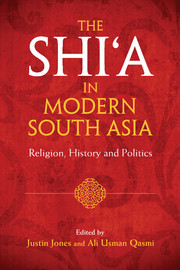Book contents
- Frontmatter
- Contents
- Preface
- Introduction
- 1 Faith Deployed for a New Shiʿi Polity in India
- 2 The Ismaʿili – Isna ʿAshari Divide Among the Khojas
- 3 Local Nodes of a Transnational Network
- 4 Shiʿism, Humanity and Revolution in Twentieth-century India
- 5 Universalising Aspirations
- 6 Muslims, Media and Mobility in the Indian Ocean Region
- 7 Shariʿa, Shiʿas and Chishtiya Revivalism
- 8 Third Wave Shiʿism
- Contributors
- Index
6 - Muslims, Media and Mobility in the Indian Ocean Region
Published online by Cambridge University Press: 05 May 2015
- Frontmatter
- Contents
- Preface
- Introduction
- 1 Faith Deployed for a New Shiʿi Polity in India
- 2 The Ismaʿili – Isna ʿAshari Divide Among the Khojas
- 3 Local Nodes of a Transnational Network
- 4 Shiʿism, Humanity and Revolution in Twentieth-century India
- 5 Universalising Aspirations
- 6 Muslims, Media and Mobility in the Indian Ocean Region
- 7 Shariʿa, Shiʿas and Chishtiya Revivalism
- 8 Third Wave Shiʿism
- Contributors
- Index
Summary
Travelling headers and connecting print cultures
Attempts in thinking about the relationships between globalisation, media, transnationalism and Islam have sought to explore their effects on Islamic imaginaries and traditional institutions of authority. These studies assume a framework that sees globalisation and transnationalism as part of the processes of western modernity, not adequately attending to the idea of religion as an alternate globaliser or a realm of sociality, in which economic, political and cultural networks are underpinned by shared identities. In contrast, links between Islamic practices and Muslim communities can be seen as forging transnational networks across localities, where the use of technology by Muslims in service of Islamic reform constitutes a moral universalism. The popular use of print and media technologies for Islamic proselytisation and reform could be seen to give rise to a different epistemic process that is associated with the willingness of a subject to adhere to traditions, producing what has been termed as pious subjectivities. In the case of Indian Muslims the popular use of media also indicates exclusion from the dominant nationalist imaginary, for religious groups tend to use media rather than state processes such as law in seeking intervention. Further, the use of technology by Muslims to articulate an Islamic moral universalism, this chapter seeks to argue, is unlike a singular telos demonstrated by other universal claims, since it is underpinned by different goals, internal contestations and disparate trajectories within the often undifferentiated category of Muslims.
With this debate in mind, the following chapter describes two distinct trajectories of Twelver Shiʿi reform practices that deploy print and electronic media in the Indian Ocean region towards varying ends, as manifested by two contemporary Shiʿi organisations. World Islamic Network (WIN), the first of these, is an initiative that operates from the western India coastal city of Mumbai (Bombay). As described in greater detail later, WIN seeks to create a transnational religious market for Twelver Shiʿism by printing and distributing books, as well as running its own television channel where cultural programmes on Muslim culture and Islamic pasts are broadcast.
- Type
- Chapter
- Information
- The Shi‘a in Modern South AsiaReligion, History and Politics, pp. 131 - 158Publisher: Cambridge University PressPrint publication year: 2015
- 2
- Cited by



